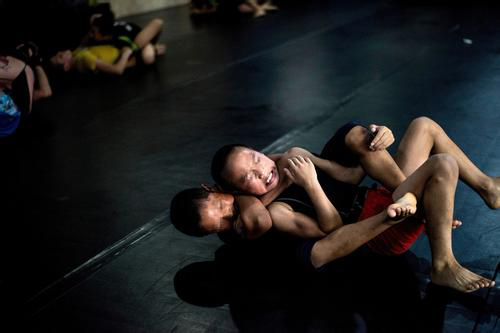當(dāng)前位置: Language Tips> 新聞播報(bào)
分享到
兩周前,我講述了廣東格斗孤兒德瑞克的故事。無論在中國還是其他國家,都有很多像德里克這樣的問題青年,他們生活在社會(huì)邊緣,幾乎無法謀生。在美國,警察率先帶頭幫助這些問題青年。作為社會(huì)安全的第一道防線,警官親眼看到了德瑞克這樣的少年遇到的問題。美國每個(gè)州都有數(shù)百所警察體育聯(lián)盟中心,警員自愿充當(dāng)孩子們的導(dǎo)師,為他們指明前進(jìn)的道路。

By Randy Wright
“With nowhere else to go, he fights”.
“格斗孤兒用拳擊與命運(yùn)抗?fàn)帯薄?/p>
That was the headline two weeks ago, when I wrote about Derek, a 15-year-old orphan from Guangdong province who wants to be a mixed martial arts champion.
這是我兩周前一篇文章的標(biāo)題,寫的是一名15歲的廣東孤兒德瑞克,他夢想成為一名綜合格斗冠軍。
He lived alone in a rough neighborhood, with barely enough money to buy food. He would fight in underground clubs whenever he could. Recently, he was dangerously knocked out by an older, stronger opponent.
他一個(gè)人住在安全不好的小區(qū),吃飯的錢都沒有,有機(jī)會(huì)就去地下俱樂部格斗。最近一場比賽中,他被一個(gè)更成熟更強(qiáng)大的對手打的很慘。
Such fights are illegal, I've been told. Derek told me about the gamblers, the raucous crowds, the booze and the bikini-clad girls who prance around and fawn over the fight winners. Yet he views the octagon as a temple. He sees it as his ticket to a better life.
我被告知,這種比賽是違法的。德瑞克和我講了俱樂部的賭徒,人群喧鬧,縱酒狂歡,比基尼女孩在周圍熱舞,討好獲勝選手。但他卻把拳臺(tái)當(dāng)成神殿,把它當(dāng)成通往幸福生活的門票。
In China and elsewhere, there are many at-risk youth like Derek — kids at the margins of society with little to live for. Hopelessness can lead them into criminal gangs, drugs, prostitution, violence, prison and even suicide. Derek himself carries the scars of self-inflicted knife wounds from the time he tried to take his own life and failed.
無論在中國還是其他國家,都有很多像德里克這樣處于危險(xiǎn)中的青年,他們生活在社會(huì)邊緣,幾乎無法謀生。絕望可能讓他們走向團(tuán)伙犯罪、毒品、賣淫、暴力、監(jiān)獄、甚至自殺。德瑞克身上留有多處自殺未遂的刀疤。
Bottom line: When there's nowhere else to go, it's easy to go nowhere.
當(dāng)人無路可走時(shí),最終就很容易走向極端。
The vicious cycle can only be broken by caring people. In the United States, it's police departments that have taken the lead with at-risk youth. As society's first line of defense, officers see firsthand the problems of people like Derek. At hundreds of Police Athletic League centers in every US state, officers volunteer to mentor kids and point them in a positive direction.
有人關(guān)心他們才能打破這個(gè)惡性循環(huán)。在美國,警察率先帶頭幫助這些問題青年。作為社會(huì)安全的第一道防線,警官親眼看到了德瑞克這樣的少年遇到的問題。美國每個(gè)州都有數(shù)百所警察體育聯(lián)盟中心,警員自愿充當(dāng)孩子們的導(dǎo)師,為他們指明前進(jìn)的道路。
The league was founded in 1914 by a visionary police captain, John Sweeney, in New York City's poverty-stricken Lower East Side. The idea was to give youth a place to go and to help them build character through athletics. Today there's hardly a city of any size in the US that doesn't have a PAL affiliate or similar program. Millions of kids' lives have changed for the better.
1914年,一位遠(yuǎn)見卓識(shí)的警長約翰?斯威尼,在紐約貧困的下東區(qū)成立了該聯(lián)盟,旨在為年輕人提供一個(gè)去處,通過體育運(yùn)動(dòng)塑造其個(gè)性。現(xiàn)在,在美國任何城市,都不難找到該聯(lián)盟或類似的組織。數(shù)百萬兒童的生活因此變得更美好。
Some PALs offer boxing and martial arts training, which would appeal to Derek. But that hardly scratches the surface of what they do. The national PAL association lists well over 100 activities for youth — a long lineup of sports, to be sure, but also training in life skills, the arts and academics; from cooking to computers, pottery to theater — all provided free of charge. Adult volunteers from all walks of life are welcome. In some places, police officers even help kids with their homework.
有些中心提供拳擊和武術(shù)訓(xùn)練,這對德瑞克應(yīng)該很有吸引力。但這只是他們提供的活動(dòng)中的一小部分。美國警察體育聯(lián)盟協(xié)會(huì)向青少年提供100多種活動(dòng)——除了一長串的體育活動(dòng)外,還包括生活技巧、藝術(shù)和學(xué)術(shù)培訓(xùn);從烹飪做飯到電腦編程,從陶藝到戲劇,所有項(xiàng)目都是免費(fèi)的。該協(xié)會(huì)歡迎各行各業(yè)的成人志愿者加入其中。某些地方,警察甚至幫孩子輔導(dǎo)家庭作業(yè)。
The PAL mission remains unchanged after more than a century: to keep young people out of trouble by channeling their energies into constructive pursuits.
100多年來,警察體育聯(lián)盟的使命不曾改變,那就是:引導(dǎo)孩子追求積極向上,從而幫他們走出困境。
The personal relationships with police officers are crucial. Experience in the US shows that when the officers are known and respected, respect follows for the laws they enforce. That's worth a serious look.
警察和群眾的關(guān)系非常關(guān)鍵。美國的經(jīng)驗(yàn)表明,如果警察知名且受尊敬,那么他們執(zhí)行的法律也會(huì)受尊敬。這點(diǎn)值得深思。
An old slogan rings true: It's better to build a boy than to mend a man.
老話說的好:“少成若天性,習(xí)慣成自然。”
Postscript: Since my last column, Derek was offered a home by a caring family. He's getting regular meals. He has started school. I convinced him to go to bed at 9 pm and rise at 5 am.
附言:上次采訪完,德瑞克就找到一家富有愛心的家庭。他的飲食規(guī)律起來,也開始上學(xué)了。我說服他晚上9點(diǎn)睡覺5點(diǎn)起床。
“How do you feel now?” I asked.
“現(xiàn)在感覺怎么樣?”我問。
He answered: “Rebirth.”
“就像重生,”他回答道。
英文來源:“CHINA DAILY”微信公眾號(hào)
翻譯:鄭瀟(中國日報(bào)網(wǎng)iNews譯者)
編審:丹妮 董靜
音頻編輯:焦?jié)?/p>
更多內(nèi)容請關(guān)注“CHINA DAILY”微信公眾號(hào):

Broadcaster:

Randy Wright joined China Daily as an editor in 2013. His career spans 36 years and 10 newspapers in the United States in senior management, editorial writing and reporting roles. He served as adjunct faculty at the University of Arizona and has consulted for many publications, including the California Bar Journal for lawyers and judges. He is a licensed pilot in the US.
分享到
關(guān)注和訂閱

關(guān)于我們 | 聯(lián)系方式 | 招聘信息
電話:8610-84883645
傳真:8610-84883500
Email: languagetips@chinadaily.com.cn